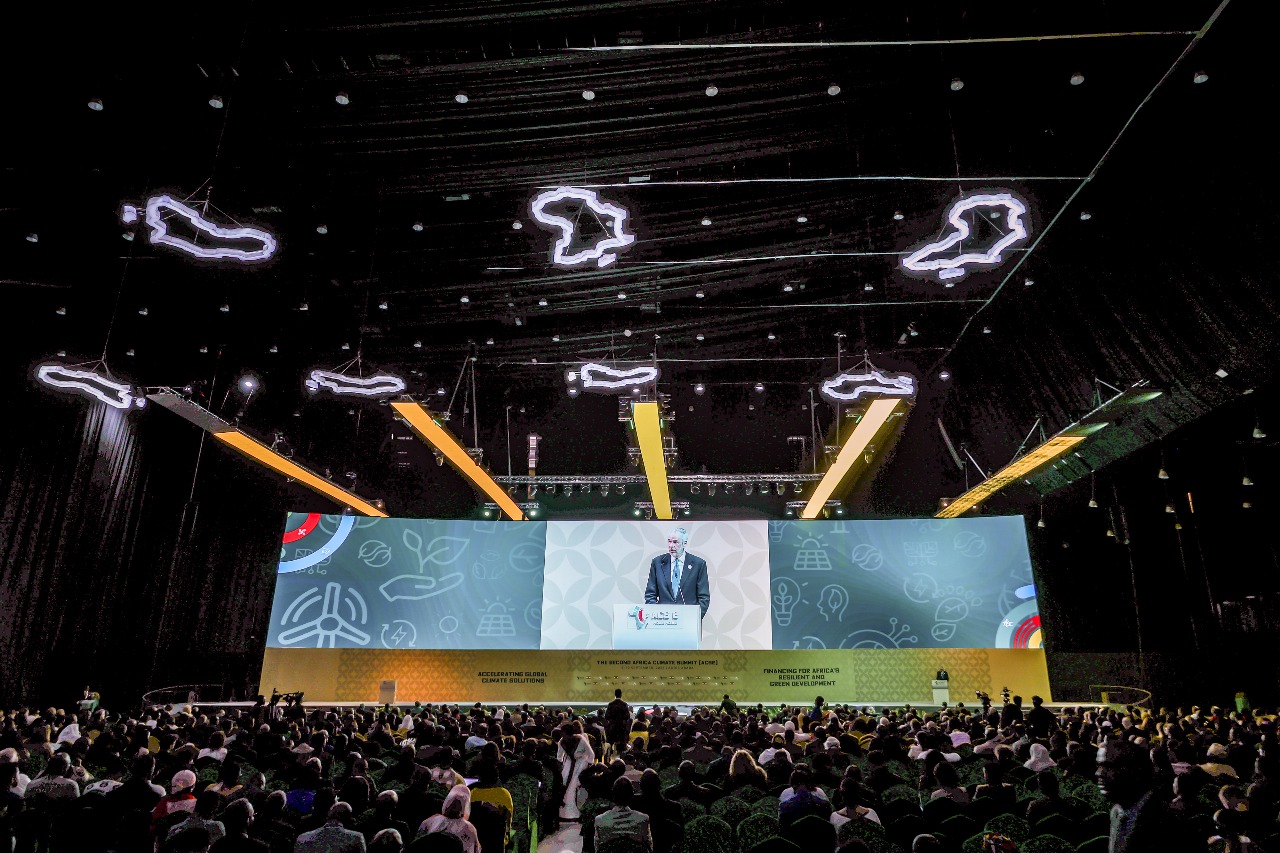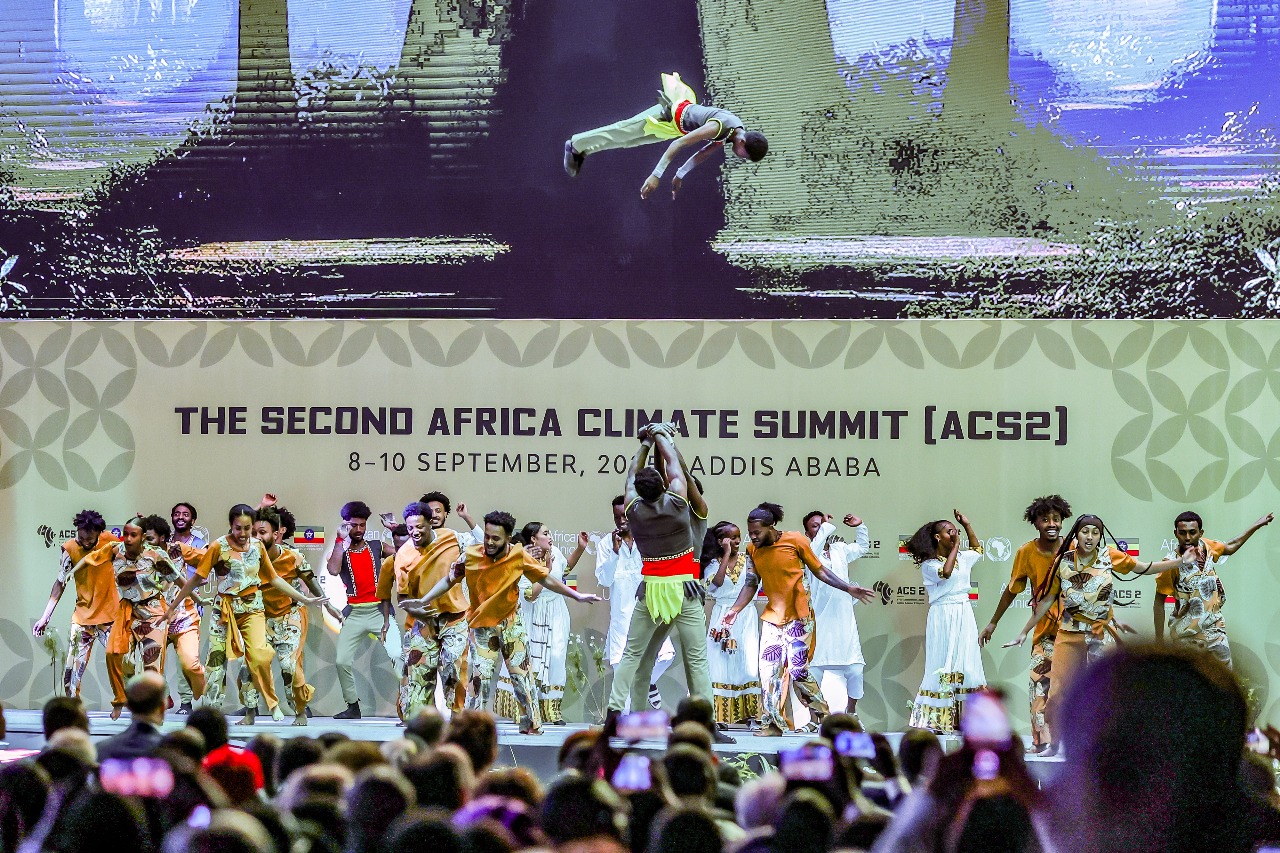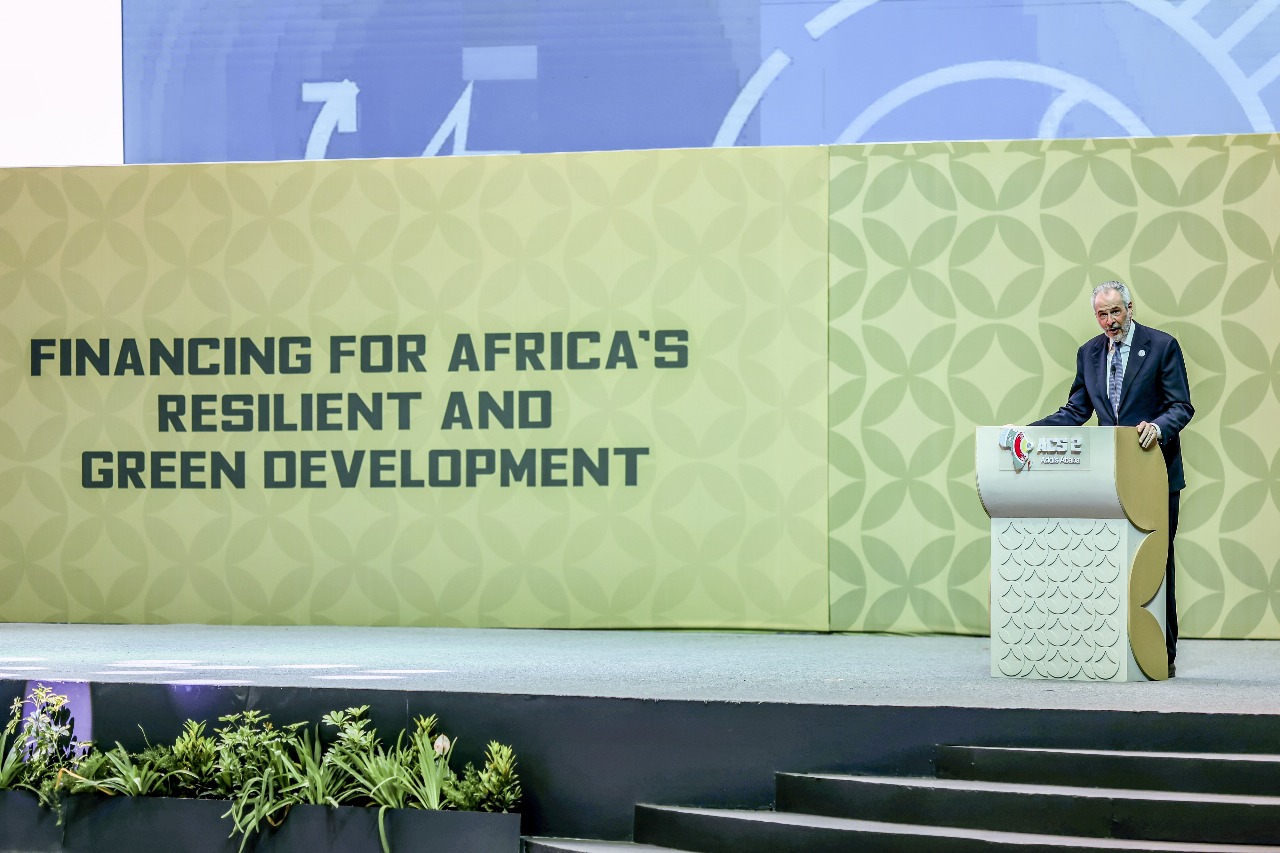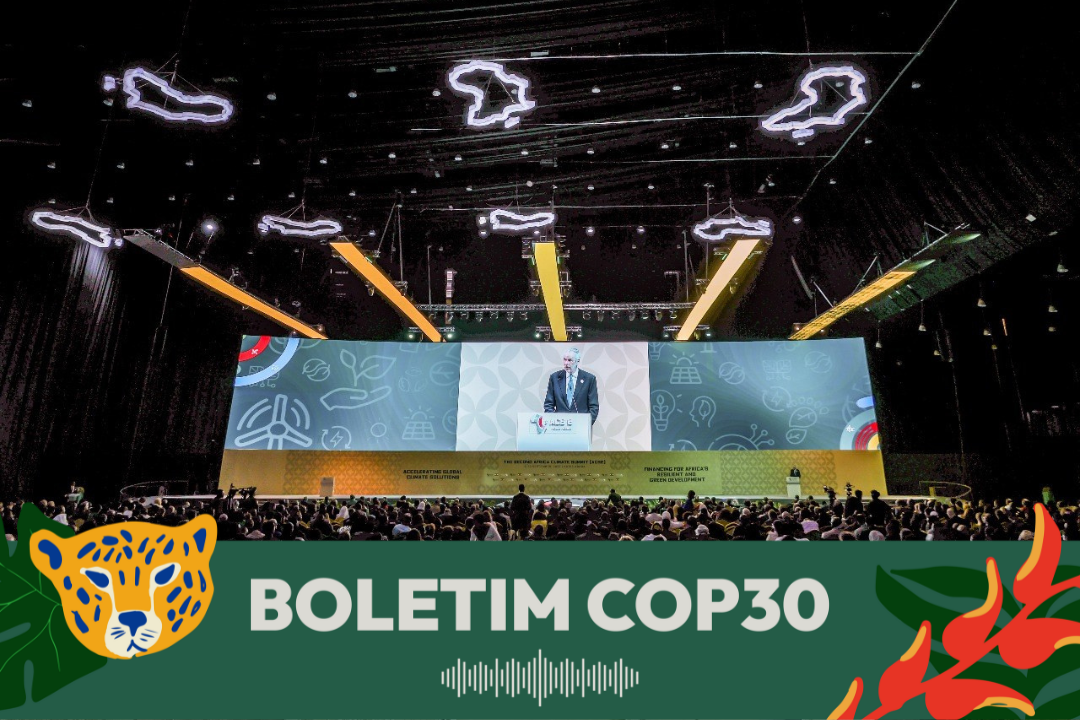Continental Unity and Pursuit of Financial Justice Mark Africa Climate Summit in Ethiopia
The second Africa Climate Summit in Addis Ababa opened with more than 45 heads of state calling for climate justice and presenting homegrown solutions. Africa and Brasil underscored historical ties and highlighted the continent’s vast renewable energy potential. The challenge: transforming global promises into real, accessible financing.

By Leandro Molina / COP30 Brasil
With a tone of solidarity and urgency, Ambassador André Corrêa do Lago, president-designate of COP30, addressed the opening of the second Africa Climate Summit in Addis Ababa, Ethiopia, on Monday, September 8, emphasizing the historic ties between Brasil and Africa. “Africa is part of our identity,” he said, issuing a call for joint action. “When Africa speaks with one voice, the world must listen.”
Corrêa do Lago outlined three priorities for COP30, to be held in Belém this November: strengthening climate multilateralism, connecting negotiations to the real economy and to people’s lives, and accelerating implementation of the Paris Agreement. “Some actors would be happy to see multilateralism fail. Together, we can prove them wrong,” he declared, defending the multilateral system as the only viable path.
The Brazilian diplomat stressed the “climate injustice” imposed on the continent. “The world must fight climate change for Africa, because Africa’s contribution to global warming is absolutely minimal,” he said. He described the “paradox of abundance and deprivation” facing Africa—rich in natural resources yet burdened by severe social indicators—a reality that mirrors the Brazilian Amazonia.
These remarks echoed the central message of African leaders at the summit: Africa must not be seen as a mere victim of the climate crisis but as a continent of solutions. Kenyan President William Ruto recalled that the Nairobi Summit in 2023 repositioned Africa as “a power in the global framework.” But he warned of growing volatility. “Precisely when the scale of the climate crisis demands more cooperation, solidarity is unraveling. Isolation is not a strategy. It is a failure.”

The summit seeks to consolidate commitments from the Nairobi Declaration of 2023, which established a unified African stance on the climate emergency. Priorities include expanding renewable energy capacity to 300 gigawatts by 2030, ensuring universal access to energy, and supporting green industrialization. Organizers view this energy transition as irreversible and essential for job creation, strengthening local economies, and reducing dependence on fossil fuels.
H.E. Mahmoud Ali Youssouf, Chairperson of the African Union Commission, presented stark figures to justify the demand for justice. Africa contributes only 4 percent of global emissions but needs US$300 billion to finance its adaptation plans. “The continent’s priorities are clear,” he said, citing climate-smart agriculture, energy transition, and the blue economy. He called for a robust loss and damage fund and a carbon credit system managed by an independent international body.
Ethiopian Prime Minister Abiy Ahmed Ali offered one of the strongest visions of Africa’s potential. “We are not here to negotiate our survival. We are here to build the world of the next climate,” he declared. He highlighted domestic initiatives such as the “Green Legacy,” which has planted 48 billion trees, and the planned “Grand Squadron Project,” a dam expected to generate 5,000 megawatts of renewable energy. “Africa can be the first continent to industrialize without destroying its ecosystems,” he said, proposing a continental “Solutions Pact” to spur innovations in energy, agriculture, and water.
Ethiopian Minister of Planning and Development Fitsum Assefa underscored Africa’s agency in tackling the crisis. “Ethiopia is honored to host this historic meeting, which showcases African solutions and mobilizes financing at scale. In these three days, we will turn ideas into action and bring Africa’s unified voice to global platforms,” she said.
Concrete Offers and Demands
Speeches converged on presenting specific demands to the international community:
1. Reform of Financial Architecture: reducing the cost of capital, expanding concessional financing (grants and low-interest loans), providing debt relief, and eliminating bureaucratic barriers to access funds.
2. Operationalizing Loss and Damage: swiftly implementing the fund agreed at COP27 to channel resources directly to countries already hit by irreversible climate disasters.
3. Investment in Existing Solutions: leaders urged partners to stop viewing Africa merely as an aid recipient and instead invest in its innovations. “We ask our partners not to engage with us because we are impacted, but to invest with us because we are visionary,” Abiy Ahmed said.
Somali President Hassan Sheikh Mohamud illustrated the cruel irony of the climate crisis. His country’s emissions are negligible, yet it is among the most affected, with recent severe droughts displacing millions. He detailed national plans for renewable energy and land restoration but stressed they depend on international financing to materialize.
Civil society, represented by Mujica Poyla, offered a critical counterpoint, calling for accountability. “The Nairobi Declaration was visionary, but are many of its promises realistic? Africa cannot enter another cycle of broken promises,” he said. He urged the Addis Ababa Declaration to be explicit on “what” will be done, “when,” and “with whom,” ensuring that women, youth, and Indigenous communities are actively included in decision-making.
The Road to COP30

Corrêa do Lago emphasized that Brasil is preparing a “COP of Implementation” and will embrace Africa’s priorities. “We want to create a reservoir of solutions, and I am certain the world will be surprised by what countries like Brasil and the African continent can bring,” he said.
The summit also reinforced the connection between the planet’s “two lungs”: Amazonia in Brasil and the Congo rainforest in Africa. Both biomes play a vital role in regulating the global climate, linking the continents in their call for stronger policies against the climate crisis.
The message from Addis Ababa is clear: Africa is uniting not to ask for charity but to demand climate justice and offer partnership. The continent arrives at the global table with vast renewable energy potential, nature-based solutions, and a young, innovative population. The challenge now is whether the world—especially developed nations—will heed this unified voice and turn promises into real, accessible financing.
Read the full speech by the COP30 President, André Corrêa do Lago, at the opening of the Africa Climate Summit in Addis Ababa, Ethiopia
Prime Minister of Ethiopia, his excellency Abi Ahmed, the chairman of the Commission of the African Union, Sir Mahmoud Youssef, heads of states and government, distinguished leaders, excellencies, it's a great honour to stand before you on African soil and address the second African climate summit, bringing together Africa's leader, and as a sequel of the historic first Nairobi summit.
Africa's unity through the African Union is a gift to the world. When Africa comes together with one voice, the world must listen. As we all know, Brasil has historical human ties with us. People of African descent represent almost 60% of Brazilians and we are extremely proud of it. As President Lula says, Africa is part of our identity.
And I have to say that the show that we had at the opening of this ceremony with these amazing musicians and dancers, as a Brazilian I really wanted to join them on the stage.
Against the background of systemic uncertainty, in which climate urgency interacts with compounding geopolitical and socioeconomic challenges, Brasil is working hard for COP 30 to represent an inflection around three priorities. One, reinforce unilateralism and the climate change regime under the UNFCCC.
Second, connecting the climate regime to people's real lives and the real economy. And third, accelerating the implementation of the Paris Agreement. The incoming COP 30 presidency counts with Africa to secure and safeguard the multilateral climate system. Although imperfect, we know multilateralism is the only way to fight climate change.
And we know some actors would be happy to see multilateralism fail. Together, we can prove them wrong. Together, we can change by choice rather than being imposed change by global warming.
The world needs to fight climate change. The world needs to fight climate change for Africa, because, as was said here before, the contribution of Africa for global warming is absolutely minimal. So, this deeply unfair situation shows climate injustice at the highest level. Africa is rich beyond measure.
This continent has a potential that is extraordinary, but the realities of today are already extraordinary. There is a paradox of abundance and deprivation that is a challenge to all to confront. I believe that the leaders here present have the power to rewrite.
Special needs and circumstances are a scientifically legitimate demand and it is also an ethical imperative. The increased vulnerability to climate impact will hamper the development of most countries of Africa and also of the continent of where Brazil is, Precisely when their peoples are progressing towards improving their standards of life.
We cannot allow climate change to hinder the right to development of the people. Challenges of climate change are challenges of developments in all its dimensions. The five principles embodied in the 1992’s Convention: mitigation, adaptation, finance, technology, and capacity building.
We know we need to reform the multilateral financial architecture and remove barriers and address disablers faced by developing countries in finance and climate action, including the high cost of capital, the limited fiscal space, the unsustainable debt levels, the high transaction costs, the conditionalities for accessing climate finance. We must progress in mainstreaming climate into investment and finance.
I must acknowledge here his excellency the president of Kenya, William Ruto, because of the Nairobi declaration which together with the bridge town initiative that prime minister Mia Motley, who was here yesterday, are inspirations for minister Babayeva and I to prepare the Road Map from Baku to Belem. On Saturday, on the special event on the special circumstances of Africa, we heard from the Ethiopian Minister of Planning and Development that Africa cannot be seen only as a victim of climate change, but as a provider of solutions.
The Prime Minister, this morning, in the exceptional speech, has also mentioned so many of the solutions that Africa can bring to the continent and to the world. As I heard this week from many leaders, Africa is not waiting. The examples are shining.
I think that Ethiopia, with its investment in energy mix that is not only clean, but also resilient, and we have the amazing initiative of the Green Legacy initiative aimed at planting 50 billion trees in Ethiopia, is an inspiring example for us all.
A just and inclusive energy transition on the continent is looking ever more like an opportunity to create jobs, distribute wealth, and generate income in particularly for the youth. We refer to just energy transitions in Brasil, because we must recognize that every country, every region have to have its own path.
And in Brasil, at COP 30, we are absolutely ready to embrace many of the priorities of Africa and a very special focus will be given to Mission 300 and Clean Cooking at COP 30.
As we are preparing a COP in a tropical forest, we will also have many things regarding the forest. We must make sure that forests are seen by the world as solutions to many of the problems that were caused by other countries. In that context, we must have mechanisms that deal with the three great challenges we have with forests, which is fighting deforestation, which is also restoration of forests, and obviously the conservation of forests.
In that context, we need many instruments, and Brasil is going to strengthen the ideas surrounding the Tropical Forest Forever Facility that it is promoting.
But adaptation, how can we not talk about adaptation, a key priority for COP 30?
The adaptation agenda will focus not only on scaling finance, advancing the global goal on adaptation, but integrating resilience across all sectors of development. Climate shocks already cost the global economy hundreds of billions annually, making it urgent to mainstream adaptation into all economic instruments, from planning and budgeting to trade and investment framework.
By investing in adaptation, we safeguard infrastructure, protect communities, and unlock opportunities for a sustainable. In my first letter, as COP president designate, I invited international community to join hands in what we call a mutirão.
Mutirão is when everybody gets together with the same objective, but each one doing what they know how to do and doing it by themselves. In the run up of COP 30, we wanted to mobilize all actors in this global mutirão, government, civil society, private sector, indigenous people, local communities, all together to enhance climate action.
The Brazilian delegation this week in Addis Ababa, included the ministry, the Minister of Environment, myself as President designate, but also the CEO of COP 30, also the high-level champion, the youth champion. So, we brought everyone that is going to prepare COP30 to Africa to listen to all the dimensions that Africa wants to see included in COP30.
One of the many reasons that we go back to Brasil very excited about we can do is because we are preparing an action agenda that is designed to receive the solutions that Africa wants to present to the world. So, this is an invitation to all sectors of the African countries of this extraordinary continent to come to Brasil.
We need concrete answers to climate change. And we have taken the approach of building upon all the other presidencies of COPS have made before us. So, we need to have a granary of solutions, and I am sure that the world will be surprised by what countries like Brasil and the continent of Africa can present.
We want COP to be a COP of implementation. But why this moment is a COP of implementation? Because we have already negotiated a lot. We can already implement a lot. As we continue to negotiate, as we continue to have papers, we will have action to show.
Excellency, ladies and gentlemen, President Lula wanted since the beginning, since the first moment, to bring the cop to the heart of the Amazon. He wanted to show the world the reality of the forest that everyone loves, but very few actually know. The Amazon shares the African paradox.
One of the world's richest nations, and one of the richest regions in Brasil, and at the same time, unfortunately, with all its natural resources, it is a region that has the poorest indicators in Brasil. I am sure that all the things that unite Brasil and the African continent will be very clear at COP30.
We know that together with Africa, we are totally convinced that we can make an exceptional COP 30.
Thank you very much.

